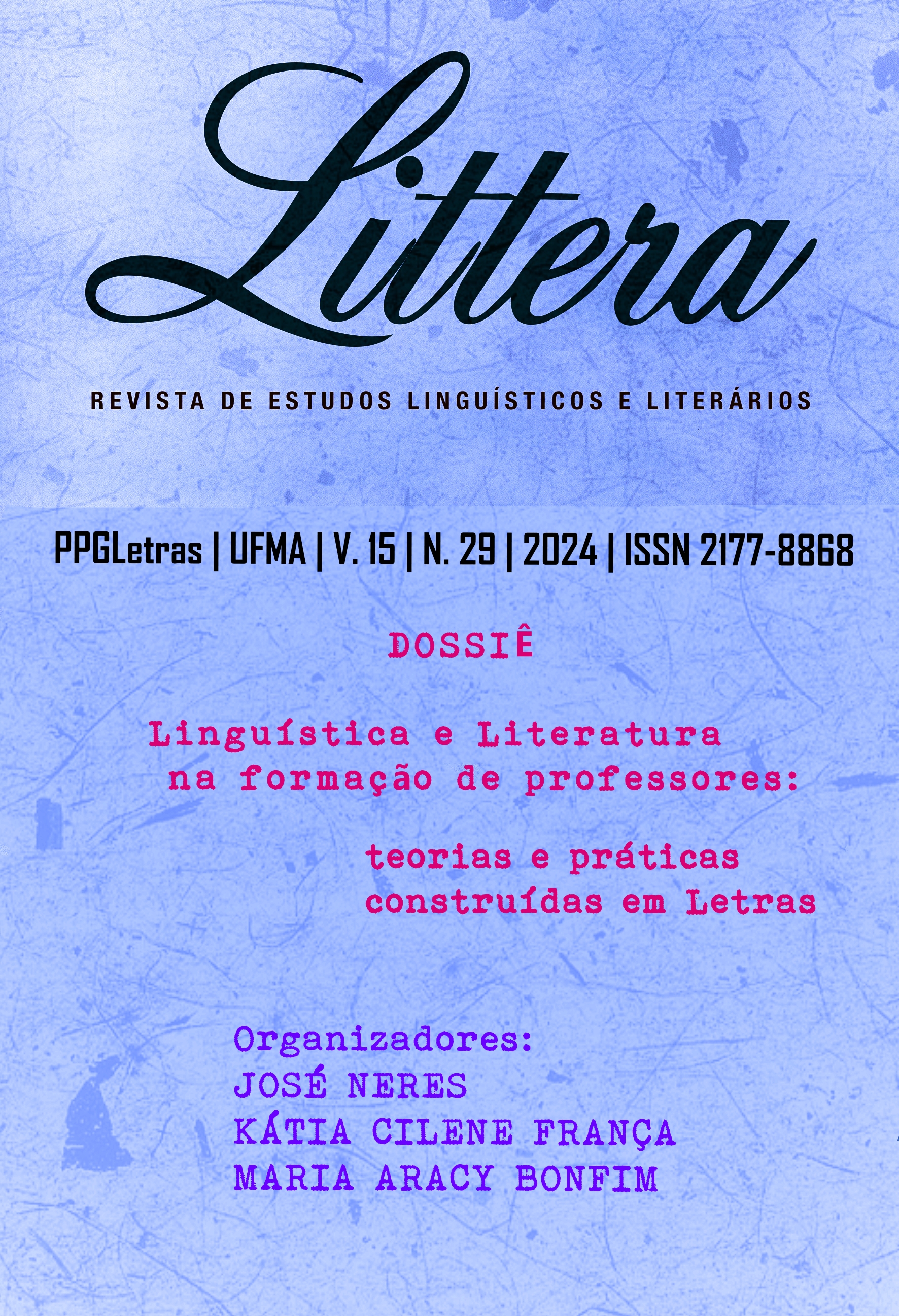Da gramática à gramaticalização
o ponto onde a Linguística toca a leitura do texto literário
DOI:
https://doi.org/10.18764/2177-8868v15n29.2024.4Keywords:
Linguistics, Grammatization, Reading, LiteratureAbstract
The article aims to discuss the productivity of the relationship between Linguistics and Literature as guideline for the act of reading. In this discussion, it is emphasized that a relevant resource to read the literary text is the linguistic description of the moves, which presupposes grammar. Deepening cognition on the subject, finds grammaticalization as a point of articulation between linguistics and literature for the monitoring of the literary game movement. Supported by these concepts, the research puts strategies for reading in progress. In the reading universe, there are selections of linguistic phenomena which cannot be dissociated from the co-production of meaning to which every reader is subjected. Among these phenomena, we can highlight the importance of plays in a path of signals that lead to the understanding of the text. Having as a starting point this purpose, we follow the paths that lead us to the elements responsible for reading comprehension from the normativity of language to its malleability in the infinite possibilities that sustain in grammar and expand beyond it, in grammaticalization. We intend to consider the analysis of the grammaticalization process as an act of reading to produce the flexible vision of Portuguese grammar, especially for the moment in reading the literary text. We problematize: could then be grammaticalization one of the relevant consequences of this articulation between linguistics and literature? Among the authors listed for this discussion, we are taking into consideration Saussure (2012), Possenti (2002), Perini (1976, 2014), Martins (2012), Neves (2002, 2007), Jouve (2002). Among the data, the political pedagogical projects of the Course of Letters of UFMA 2009, from two records found in internet and fragments of literary texts.
Downloads
References
ALLOUCH, Jean. Letra a letra: transcrever, traduzir, transliterar. Tradução de Dulce Dque Estarda. Rio de Janeiro: Campo Manttêmico, 1995.
CHARTIER, Roger. Cultura escrita, literatura e história: conversas de Roger Chartier com Carlos Aguirre Anaya, Jesus Anaya Rosique, Daniel Goldin e Antonio Saborit. Traduçao deErnani Rosa. Porto Alegre: Artes Médicas, 2001.
JOUVE, Vincent. A leitura [tradução Brigitte Hervor]. São Paulo: Editora Unesp, 2002.
KOCH, Ingedore Grunfeld Villaça. Introdução à linguística textual: trajetória e grandes tema. 2. ed. São Paulo: Editora WMF Martins Fontes, 2000.
LABOV, W. Padrões sociolingüísticos. Tradução de M. Bagno; M. M. P. Scherre; C. R. Cardoso. São Paulo: Parábola Editorial, 2008.
LACAN, Jacques. O Seminário. Livro 11. Os quatro conceitos fundamentais da psicanálise. Tradução de M. D. Magno. Rio de Janeiro: Jorge Zahar, 1998.
MOHANA, João. O outro caminho. Rio de Janeiro: Editora Ágil, 1974.
MOITA LOPES, Luiz Paulo da. (Org.) Por uma Linguística Aplicada indisciplinar. São Paulo: Parábola, 2006.
MORIN, E. Introdução ao pensamento complexo. Porto Alegre, Sulina, 2011.
NEVES, Maria Helena de Moura. A gramática: história, teoria e análise, ensino: Editora UNESP, São Paulo, 2002.
NEVES, Maria Helena de Moura. Que gramática estudar na escola? 4. ed. São Paulo: Contexto, 2011.
NEVES, Maria Helena de Moura. A gramática: história, teoria e análise, ensino. São Paulo: Contexto, 2010.
PÊCHEUX. Michel. Semântica e discurso: uma crítica à afirmação do óbvio. Tradução de Eni Orlandi et al. Campinas: UNICAMP, 1997.
PERINI, Mário Alberto. A Gramática gerativa: introdução ao estudo da sintaxe portuguesa. Belo Horizonte: Vigília, 1976.
PERINI, Mário Alberto. Defino minha obra gramatical como a tentativa de encontrar resposta às perguntas: por que ensinar gramática? Que gramática ensinar? In: NEVES, Maria Helena de Moura; CASSEB-GALVÃO, Vânia Cristina. Gramáticas Contemporâneas do Português: com a Palavra, os Autores Edvaldo Bechara... São Paulo: Parábola Editorial, 2014.
POSSENTI, Sírio. Por que (não) ensinar gramática na escola. Campinas, SP: Mercado de Letras; Associação de Leitura do Brasil, 1996. (Coleção Leituras no Brasil).
POSSENTI, Sírio. Por que (não) ensinar gramática na escola. São Paulo: Mercado de letras, 2003.
SAUSSURE, Ferdinand de. Curso de linguística geral. 28. ed. São Paulo: Cultrix, 2012.
Downloads
Published
How to Cite
Issue
Section
License

This work is licensed under a Creative Commons Attribution-NonCommercial-NoDerivatives 4.0 International License.
Direitos autorais Littera on line
Este obra está licenciado com uma Licença Creative Commons Atribuição-NãoComercial-SemDerivações 4.0 Internacional.











